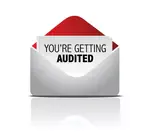- Essential Bookkeeping Habits For Audit Ready Books in Canada
- Tax Audits in Canada
- Underground Economy
CRA and the Underground Economy
How to Record "Cash Under the Table" Transactions
By L.Kenway BComm CPB Retired
This is the year you get all your ducks in a row! Start by starting.
Updated January 14, 2026 | Edited May 8, 2024 | Published Originally on Bookkeeping-Essentials in 2009
Small Daily Habits Can Move Mountains
Do just one task today towards meeting your tax compliance obligations. Just one.
WHAT'S IN THIS ARTICLE
What is UE? | CRA Audit Techniques | Not Reporting Income | Audit Proof Method | Tax Evasion vs Avoidance | FAQ Cash Under The Table | Legal Planning Tools
NEXT IN SERIES >> CRA Subcontracting Reporting Requirements
 Why should I report my cash sales? No invoice, no record, no proof. Right?
Why should I report my cash sales? No invoice, no record, no proof. Right?Highlights Of This Post
- What is the underground economy (UE) and why you should care?
- What kind of audits does CRA perform to find unreported cash?
- UE analysis of not reporting income
- AUDIT READY Simple audit proofing method
- Difference between tax evasion, tax avoidance, and effective tax planning
FAQ Cash Under The Table
- What to do when a customer wants to do cash under the table
- What to do when a supplier wants to do cash under the table
- What to do when an employee wants to be paid in cash
Examples of Legal Effective Tax Planning
What is the underground economy (UE) and why should you care?
Statistics Canada defines UE as "market-based economic activities, whether legal or illegal, that escape measurement because of their hidden, illegal, or informal nature."
Skimming and Moonlighting
Not reporting cash earnings is illegal in Canada.
You will end up paying more in tax if caught. If caught, it will lead to penalties, fines and possibly criminal convictions.
CRA defines the UE to include "economic transactions in goods or services which are unreported, resulting in failure to comply with tax laws administered by the Canada Revenue Agency. ... this includes situations in which transactions are underreported or unreported, both of which contribute to the growth of the UE. Underreporting or not reporting is considered part of the UE, regardless of whether the taxpayer is intentionally non-compliant or just unaware of their tax obligations."
The CBC reported back in 2014, CRA was auditing waiters/waitresses, sub-contractors and freelancers looking for unclaimed income. On their radar were:
- tips
- selling used cars on Craigslist
- day labor on construction sites
- home renovations subcontracted by the retail stores
- flipping houses
- driving trucks and hot shot couriers
- freelance articles income
You are participating in the underground economy which undermines the integrity of our tax system when:
- "You fail to declare income that would generally be taxable if you reported it to the tax authorities" (Definitely not a good compliance habit!) ...
- "You help others to avoid paying taxes, you support the underground economy" …
"The underground economy undermines the competitiveness of businesses and individuals because it offers an unfair, illegal advantage to those who fail to comply with Canada's tax laws."
Cash and Sales Tax
Dealing in cash thrives in the underground economy. Did you know ...
GST/HST must still be collected by registrants on cash sales. This also means that you need a receipt for expenses paid by cash if you want to claim your input tax credit.
In September 2012, Stats Can released their study of the underground economy for the years 1992 - 2009. The three most significant industries with underground activity were construction, retail trade, and accommodation and food services; accounting for 61% of the total estimate.
In February 2023, Stats Can released their study of the underground economy for the years 2014 - 2021. The four most significant industries with underground activity were construction, lessors of real estate, retail trade, and accommodation and food services; accounting for 65.5% of the total estimate. Underground activity was largest in P.E.I. and B.C.
Wages and undeclared tips accounted for the largest share of unreported income. Food, beverages, tobacco, and cannabis accounted for the largest category of underground household expenditures.
The information from the 2012 and 2023 studies were used by CRA to further develop compliance strategies for the underground economy.
During the 2010-2011 reporting period, CRA performed 834 underground economy audits, resulting in $87 million taxes owing. (see source note below) I could not find numbers for later years. It only takes one audit to change your life forever ... there is no going back ... you may want to check out the convictions posted on the CRA website where they name names for a reality check.
CRA has a voluntary disclosure program to encourage you to self-correct past returns ... or if you haven't filed past returns ... with no prosecution or penalties. You must apply before CRA has makes a demand request.
Source: CRA website> About the CRA> Tax Alert> Special enforcement audits. Special enforcement audits now fall under Criminal Investigations.
What kind of audits does CRA perform to find unreported cash?
“It is a myth that operating in cash and failing to keep records makes you immune to taxes.
If your lifestyle is not in line with the income you report, and you cannot explain the difference, the CRA can assess taxes based on indirect or alternate methods of calculating your income.”
Some of the ways CRA does this are:
- Bank audits look at your bank accounts and assume every cash deposit is income.
- Lifestyle audits look at your current expenses to estimate the minimum amount you need to earn to maintain that lifestyle.
- Net worth audits look at your assets, compare it to what you have reported as income in past returns to see if it supports your ownership of the assets.
Underground Economy Analysis of Not Reporting Income
Cons - Risks of Not Reporting Cash Income
- May result in a criminal record and a possible jail sentence if caught.
- Publicly shamed on CRA's conviction web page which may get picked up by the news media.
- Don't support tax funded social programs you use and rely on (freeloader) like EI, CPP, OAS, healthcare, education, policing, child care.
- End up paying more in taxes through significant fines and penalties if caught.
- Creates an unlevel playing field for businesses operating within the boundaries of the law.
Pros - Benefits of Reporting Cash Income
- Easier to qualify for credit.
- Reporting the earnings increases your RRSP and other registered programs contribution room; allows you to save more and reduce your taxable income legally.
- Income counts towards CPP benefits giving you more income when you retire.
- You get to sleep at night knowing you aren't doing something illegal.
SIMPLE AUDIT PROOFING METHOD
If CRA ever decides, during a tax audit of your business, to do an independent verification of income on your tax return, they can look at all of your family's personal bank and credit card accounts.
Years ago, a blog by Mark Feldstein, CPA,CA explained a good compliance habit and it still holds today. He recommended that you formally record a detailed list of all the cash and cheques (even photocopy) you receive as wedding gifts. Also keep on file your guest list, wedding venue contract, and proof of your wedding date. Mr. Felstein recommended this procedure for any life event that resulted in large deposits such as casino winnings or lump sums from relatives.
For example, one way to audit proof yourself is to keep your source documentation (or a log) of all deposits and transfers made between family member accounts ... this is especially important if you or other family members like cash transactions rather than bank or Interac transfers.
Remember to log any cash gifts that your children received from their grandparents, aunts or uncles ... or the money from friends finally repaying amounts owed to you.
AUDIT READY
Why go to all this trouble? Under audit, CRA considers any unsupported deposits as income. You must have proof that the deposit being questioned is not income. Without proof, you will be assessed tax on the amounts in question.
It is in your best interest to always create an audit trail for these types of transactions by doing an electronic transfer of funds or writing a cheque whenever possible. This is a good bookkeeping compliance habit too!
Consider starting a file (paper or electronic) for each family member that contains their bank statements, credit card statements, RRSP contributions, and investments made. It will avoid you having to pay the bank for copies during a tax audit.
Because Canada has a self-assessing tax system, the burden of proof lies with the taxpayer not with the CRA ... in other words, you are guilty until you can prove you are innocent. Audit trails and original, readable source documents go a long way to proving this.
Reference: MarkFeldstein.ca
It's difficult to change overnight, but if you are persistent and take one step at a time, you will see results!
Jack Lalanne
Cash Under the Table - Is it Tax Avoidance, Tax Evasion or Effective Tax Planning?
Tax evasion vs tax avoidance: what's the difference? Lexpert has an excellent article on when tax avoidance crosses the line to illegal tax evasion.
Under Canadian law, there is distinction between tax avoidance, tax evasion, and effective tax planning.
CRA's interpretation of tax evasion is when you deliberately ignore a specific part of law. It is an attempt to reduce your tax liability by duplicity or concealment. Tax evasion has criminal consequences including facing prosecution in court.
CRA's interpretation of tax avoidance includes all unacceptable and abusive tax planning. Aggressive tax planning pushes the limits of acceptable tax planning. It violates the spirit and intent of the law. The general anti-avoidance rule was enacted in 1988 to combat this.
CRA's interpretation of effective tax planning happens when the results are consistent with the intent of the law. Effective tax planning is completely legal --- and extremely wise. It lowers your tax bill by structuring your transactions so that you reap the largest tax benefits. These efforts do not fall under avoidance or evasion.
Here is a list of common criminal activities that are in contravention of tax law:
- Deliberately under reporting income known as skimming, or omitting income which is called moonlighting.
- Failing to file your tax returns as mandated by law.
- Keeping two sets of books or making false entries in your books and records called accounting irregularities. It may involve using tax suppression of sales software violating the income tax act and the excise tax act.
- Claiming false or overstated deductions on a return often referred to as inflated deductions.
- Claiming personal expenses as business expenses is an easy trap to fall into.
- Hiding or transferring assets or income is considered tax fraud.
- Engaging in sham transactions as it is the substance, not the form, of the transaction that determines taxability.
You are obligated by law to pay only your fair share of tax, so why pay more? Here are legal ways of strategic and effective tax planning to minimize taxable income that do not involve the underground economy:
- earn personal investment income tax free in a TFSA account
- maximize business tax deductions
- maximize personal tax credits by investing in tax-advantaged accounts like RRSPs, making donations or claiming moving expenses, medical expenses, etc.
- control the timing of income and deductions -- you'll probably need your accountant's help for this one
- be aware of special rules that apply to meals and entertainment, auto expenses, home office, and business travel.
 As a taxpayer, you have the right to legally arrange your affairs to pay the least amount of tax but you do not have the right to illegally avoid or evade tax.
As a taxpayer, you have the right to legally arrange your affairs to pay the least amount of tax but you do not have the right to illegally avoid or evade tax.FAQ Cash Under The Table
 As a taxpayer, you have the right to legally arrange your affairs to pay the least amount of tax but you do not have the right to illegally avoid or evade tax.
As a taxpayer, you have the right to legally arrange your affairs to pay the least amount of tax but you do not have the right to illegally avoid or evade tax.What To Do When ... Your Supplier or Contractor Wants You To Pay "Cash Under The Table"
What To Do When ... Your Supplier or Contractor Wants You To Pay "Cash Under The Table"
Avoid "deals" and transactions that are made to avoid tax as the expense is NOT deductible. Why give him a business advantage and a tax break?
AUDIT RISK
Paying a supplier "under the table" means you are giving up very valuable tax deductions which means you will be paying more tax on earnings reported instead of your supplier.
As a taxpayer, you have the right to legally arrange your affairs to pay the least amount of tax but you do not have the right to illegally avoid or evade tax.
What To Do When ... Your Customer Wants To Do "Cash Under The Table"
What To Do When ... Your Customer Wants To Do "Cash Under The Table"
If your customer wants to hire you with "cash under the table" ... read that as pay no sales tax ... take the business.
You can still be honest and prepare an accurate set of books. Having integrity as in, "That's not how we do things here." let's you sleep better at night and sets the right example for your kids ... yes they are watching what you do and learning.
Good bookkeeping practices require you to make the following bookkeeping entries:
- Write up a sales receipt for the total amount received. Write including sales tax on the receipt. You don't have to give a copy to the customer if they don't want a receipt for refund purposes or warranty work.
- Back out the appropriate amount of sales tax if you are a sales tax registrant. This example assumes a 12% HST rate. (Total cash received ($100) divided by 1 + sales tax rate (1.12) times tax rate (.12) = sales tax ($10.71))
- Book the remaining amount to your sales account. ($100 - $10.71 = $89.29)
- It's preferable to deposit all the cash from the sale to your business bank account. Don't give in to the temptation to just spend it. CRA likes an audit trail, especially for cash transactions.
- If you NEED CASH for your personal expenses, write yourself a cheque or transfer funds online from your business account (you have one right?) to your personal account. Withdraw or spend the funds from your personal account for personal expenses.
If you aren't a sales tax registrant, ignore step two and modify step three to book the entire amount to your sales account.
If you use QuickBooks, it will automatically calculate the sales tax portion for you if you select "inclusive of tax" when booking the invoice. The default is "exclusive of tax".
You can also use this method if you are asking, "What happens if I didn't know I had to collect GST/HST... now who will pay the sales tax?" You probably already know the answer to this ... but you, the business owner, pay for it. Think of it as an expensive lesson in learning the rules.
Be honest. Is participating in criminal activity really who you are? Underreporting business income is called skimming. Skimming crosses the line and is called tax evasion by CRA.
You can avoid possible criminal charges of tax evasion by recording all sales including cash and barter sales. Pay your fair share of income taxes (nobody likes a freeloader) to stay away from crossing the line into criminal activity.
AUDIT RISK
No invoice, no record, no proof, right? All it takes is for your customer to report the expense on their tax return then undergo an audit. During the audit, the customer can't provide the tax auditor with a receipt for the expense so they point the auditor in your direction by giving them your business name and address for followup.
Once you deliberately understate your taxes, you have crossed the line and committed tax evasion. Tax evasion is a criminal offense and the CRA does prosecute.
What To Do When ... Your Employee Wants You To Pay Them In Cash
What To Do When ... Your Employee Wants You To Pay Them In Cash
Follow these 5 easy steps to pay employees or casual labor in cash. It will protect your business while accommodating the employee; reduce your audit risk while helping avoid potential future liabilities.
Source deductions must still be withheld from cash pay cheques. It is your responsibility as an employer to know the laws and protect your employee.
However, it isn't recommended to pay in cash if you have a policy that all employees receive their pay by direct deposit.
What are some of the reasons why an employee might want to be paid in cash:
- They are trying to avoid garnished wages or want to top up their income undetected usually for one legal reason or another such as child support, alimony, law suit, avoiding police or an abusive spouse.
- Some individuals may be on some kind of government assistance which has a threshold on earnings before clawbacks begin.
- They just don't like to pay tax and think you won't withhold source deductions if paid in cash or issue a T4 at yearend.
What does the employee miss out on if you pay them in cash without source deductions?
Never mind personal risk to your business if it is uncovered during a tax audit or if they are hurt on the job. By not paying taxes the employee is not paying into benefits they probably want to utilize or will in the future - CPP, EI, RRSP contribution room.
- You can't collect EI if you don't pay into it.
- Their CPP entitlement at retirement is based on how much they contributed over their working years. Not contributing may make the difference of living in poverty when they retire or not.
- While RRSP contributions may not be on the employee's radar right now, a situation may arise in the future, such as wanting to defer tax on an inheritance or wanting to save for a deposit on their first home purchase, where they may need to utilize the tax sheltering provided by the various kinds of government registered plans ... which are based on earned income.
- Obtaining credit in the future will be difficult without a complete and reliable earnings history for the lender to rely on.
AUDIT READY
If you want to write-off the employee's earnings in your business, you need to follow the 5 steps (see the link above) so you get your tax deduction and protect your business in the event of an employee dispute or injury on the job. This way you are not supporting the underground economy either.
Examples of Effective Tax Planning
TFSA Accounts Help Minimize Taxes Paid.
What are my TFSA contributions limits?
Unlike participating in the underground economy, TFSA contributions are a legal way to reduce your income taxes payable as the income earned is not taxable. The annual contribution limit is indexed to inflation in $500 increments.
Contribution Limits
Here are the limits since inception in 2009.
Year2024 to 2026 - |
Amount $7,000 |
Total cumulative contribution possible since inception is $109,000 for someone born in 1991 or earlier that has never contributed. Unused contribution room carries forward.
* The amount was not indexed.
Who qualifies?
- Canadian residents aged 18 or over at the time of the contribution up to the amount of their unused contribution room.
- No attribution rules apply to TFSA contributions so your spouse may contribute to your TFSA.
- Contributions can be in kind (qualified) investments. This attracts a deemed disposition at the time of the contribution. Capital gains will be taxable, capital losses cannot be claimed. If you have a loss, don't transfer your investment to any registered account.
- Non-residents have no contribution room for the years they are non-residents. They still have contribution room in the year they leave and the year they return. This means you can still hold a TFSA account while being a non-resident of Canada. You just can't contribute while being a non-resident and cannot accumulate contribution room.
Contributions and Excess Contributions
Contributions are made with after tax dollars so, unlike an RSSP contribution, they are not tax deductible.
There is a tax payable of 1% per month on excess contributions even if the excess is withdrawn in the same month as deposited. However, the one time I accidentally deposited my contribution limit twice in one year (I was having a very bad year!), upon notification, the CRA kindly gave me a very limited window to withdraw the excess with no consequences. I of course took care of the issue immediately.
Qualified Investments
- Generally all arm's length RRSP qualified investments.
- Land and general partnership units do not qualify.
Taxes apply to prohibited or non-qualified investments held in a TFSA.
Income Earned
Income earned inside the TFSA does not attract tax. It accumulates tax-free. This means:
- the dividend tax credit does not apply
- capital losses are not tax deductible
- withholding tax applies to foreign dividends and they are not recoverable
- frequent trading is not permissible as it is deemed to be day trading which is a taxable activity. Any gains are deemed 100% taxable income and do not qualify for capital gains treatment at a 50% tax rate.
Withdrawals Are Not Taxable
Unlike RRSPs, TFSA withdrawals do affect your contribution room. Any withdrawals you make are added back to your contribution room the following year. Whenever possible, make your withdrawals near the end of a calendar year, so that the withdrawal increases your TFSA contribution room sooner, i.e. in the new year.
However, as your contributions were made with after tax dollars, no taxes are due upon withdrawing funds. There is no clawback of OAS (Old Age Security) if you withdraw money from your TFSA after age 65.
Reasons to Choose a TFSA Contribution Over an RRSP Contribution
- You want to save for retirement and are in the lowest tax bracket which is $58,523 in 2026 ($57,375 in 2025).
- You are saving for something that is earlier than retirement.
- You have maxed out your RRSP contribution room and want to shelter more savings from tax.
- You contributed to your RRSP and want to invest your resulting tax refund into your TFSA.
- You want a place to park your cash or cash equivalent savings for the short term protecting them from tax.
In conclusion, TSFAs are a legal way to avoid tax, unlike the underground economy.
RRSP Contributions Help Defer Taxes
What are my RRSP contribution limits?
Avoid the underground economy and instead consider this legal investment means to defer tax.
Purpose of RRSP accounts
RRSP accounts are tax-advantaged accounts designed to help you save for retirement. They are a tax deferred savings plan. The money you contribute is not taxed at the time of the contribution. It is only taxed upon withdrawal from the registered account. That's what makes these registered accounts tax-advantaged.
Some of the advantages of an RRSP are:
- Deferral of taxes on your income - not tax free
- Contributions are tax deductible
- Investment earnings grow tax-free
- Ability to convert account into a RIF (retirement income fund) when you retire or the year you turn 71
- Spousal RRSPs can reduce your household taxes paid
- Ability to borrow from your RRSP to buy your first home or pay for your education
Contribution Room and Limits
Your RRSP contribution limit is 18% of earned income reported on your prior year tax return to a maximum of $33,810 in 2026 ($32,490 in 2025).
Unused RRSP contribution room is not lost; it is carried forward. It is mandatory that RRSPs are converted to RRIFs (Registered Retirement Income Funds) or withdrawn in the year you turn 71.
Who qualifies?
Anyone with RRSP contribution room can contribute to an RRSP up to and including the year they turn 71 years old.
Qualified investments
- Money
- Guaranteed investment certificates
- Government and corporate bonds
- Mutual funds
- Securities listed on a designated stock exchange
Stick with conservative investments. Your RRSP is not the place to hold speculative investments. Plan these types of investment outside your RRSP where you can claim any capital losses. Losses inside your RRSP damage the tax-shelter value of your investments.
Withdrawals Are Taxable Income
Contributions are not taxed but withdrawals are. Early withdrawals (before you retire) only make sense if you have exhausted all other sources of cash AND in years of little to no income which will put you in the lowest tax bracket. Examples of why you might need to take an early withdrawal would be illness or unemployment.
RRSP withdrawals do not affect your contribution room as you don’t get your contribution room back unless you’re using the RRSP for the government’s Home Buyers' Plan or Lifelong Learning Plan.
Unlike TFSA withdrawals, you do pay tax on the withdrawal as your contributions were made with pretax dollars ... remember that refund you got when you initially made your contribution? Here's where you pay it back.
As RRSP withdrawals are reported as income, they will affect your OAS (Old Age Security) payment in retirement. Your OAS payment begins between age 65 and 70. Your OAS payment is clawed back (referred to as OAS Recovery Tax) when you meet certain thresholds. For July 2026 to June 2027, the inflation adjusted threshold starts at $93,454 ($90,997 for July 2025 to June 2026) with the maximum thresholds for 65-74 years old at $152,062, and 75 years old and over at $157,923.
Reasons to Choose a RRSP Contribution Over an TFSA Contribution
- You want to save for retirement and are NOT in the lowest tax bracket which is $58,523 in 2026.
- You make more than $58,523 and want to save for your first home using the government’s Home Buyers' Plan
- You make more than $58,523 and want to save for your own education using the government’s Lifelong Learning Plan.
- If you are an employee that has an employer matching plan. Always take advantage of this gift.
When Not to Contribute to an RRSP
If you are in the lowest tax bracket, it is more advantageous to contribute to a TFSA account. The concept is that you contribute to your RRSP when you are in a higher tax bracket, and withdraw the RRSP funds when you are in a lower tax bracket.









